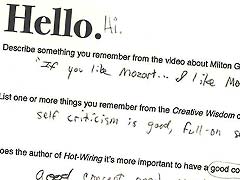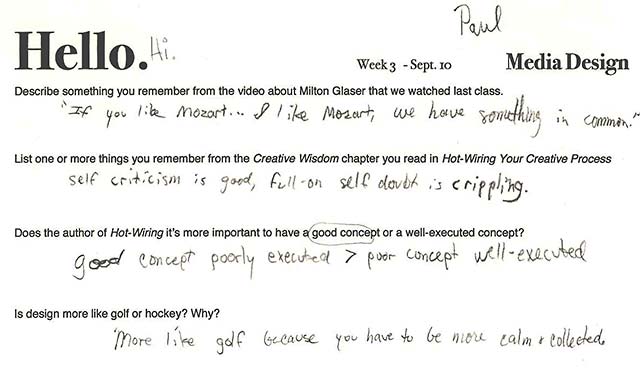OCTOBER 8, 2009
New perpective, new ideas
After a year-long sabbatical—15 months away from the classroom—I'm back and enjoying it more than ever. The time off helped me see things from a new perspective. At the start of the semester I thought about what I hoped to accomplish in class and compared it with what I was doing. Things that seemed pointless I got rid of. In their place I tried something new.
Bye-bye: attendance
I always want students to come to every class, on time, and stay for the whole thing. So I've always included attendance in my grading policy, specifying a 2 point grade deduction for each absence and 1/2 point deduction for arriving late or leaving early. I talked about this policy every semester as well as spelling it out in the class syllabus, so I'm pretty sure students knew the consequences of their behavior. The policy seems fair and logical, yet looking back it's clear that it never stopped students from (occasionally) missing class, arriving late or leaving early.
What it did do was create extra work for me (recording attendance daily) and extra stress for students. Discussions about what was an excused absence were particularly awkward (Can you show me evidence that grandma died?). At grading time there were occasional uncomfortable situations when a good student who'd been sick got a lower grade or a student doing poorly with actual class work was saved by perfect attendance.
No more of that. I have students sign in every day in case I need to talk with them about why they may be struggling in the class, but at grading time I don't look at them. Those ten points are now assigned to more tangible accomplishments in the class.
Hello: quiz
If deducting points did little to keep students from missing class, it did even less in getting them there on time. There were always a couple who wandered in five or ten minutes late. Some teachers take notice of this with a humorous or sarcastic remark, but I've never been keen on embarassing students. Since my grade-deduction stick hadn't been effective I thought I'd try a carrot. Or maybe it's a stick painted orange with green stuff on the end, I'm not sure.
On day one I told students that every day we'd start class with a "Hello" quiz. It would be no more than 5 questions. (Move your mouse over the image to see a sample)
They'd be graded only on having answered the questions, not on what they answered. I also explained that Hello quizzes only counted for 5% of their total grade, half what I used to assign to attendance.
The trick was I would gather up all the quizzes after five minutes. If they arrived late they might only have time to answer a few of the questions, and if they were more than five minutes late they'd get no points at all.
Hello quiz questions are usually based on what we discussed in the previous class. Since students are not scored on the accuracy of their answers—and I repeat that nearly every day—I get pretty honest feedback on what student are learning (or not). Some days I'm pleased that the previous class did what I'd hoped for, other days I get a sobering reminder that certain things are not clear in the minds of some students. I typically report the results to the class, using this as an opportunity to reinforce or revisit the ideas.
The Hello quiz has been more successful than I even hoped for. In the classes where I do them regularly most students are in the room 5-10 minutes before the start of class. There occasional stragglers seem apologetic when they miss a quiz. On days when I don't have a quiz prepared there are joking remarks from "disappointed" students.
The biggest payoff—more important than a class that starts without distractions—is the constant feedback I get on what students are learning. By asking about what I think are critical points, and by emphasizing that I'm not grading answers right or wrong, I get honest answers, not BS. Students who would never ask about something they didn't "get" in the last class don't need to. I see it in their answers and can deal with it either with the entire class or individually.
Maybe asking questions and listening to answers is a good idea, huh?
Top |
|
![]()


